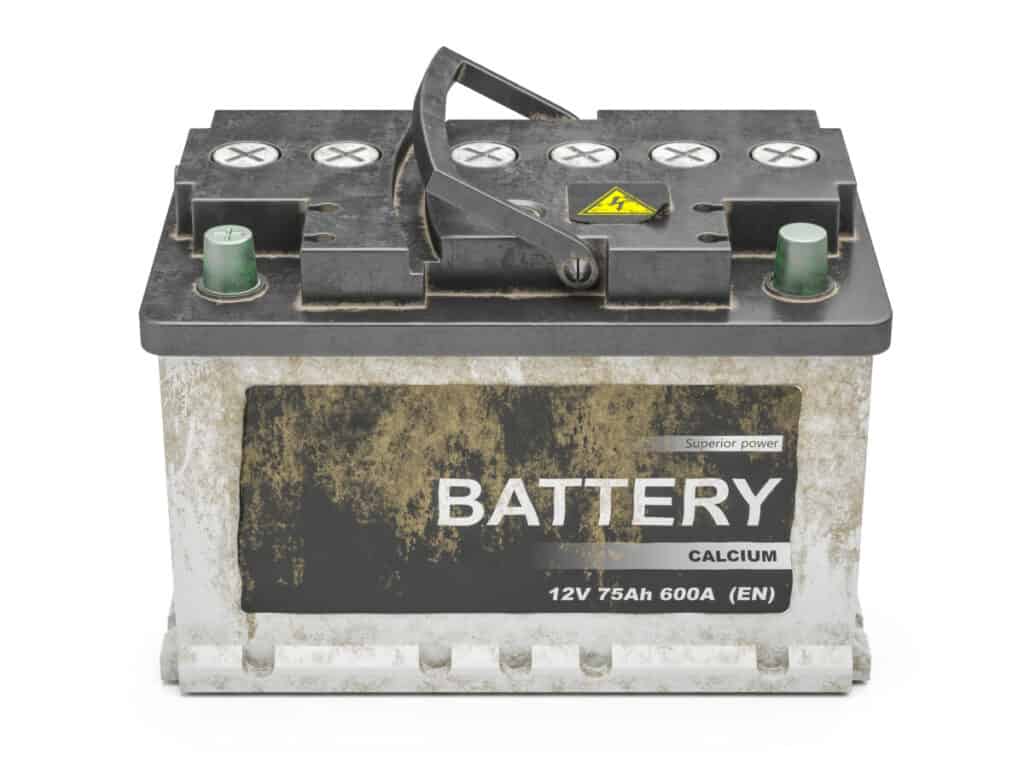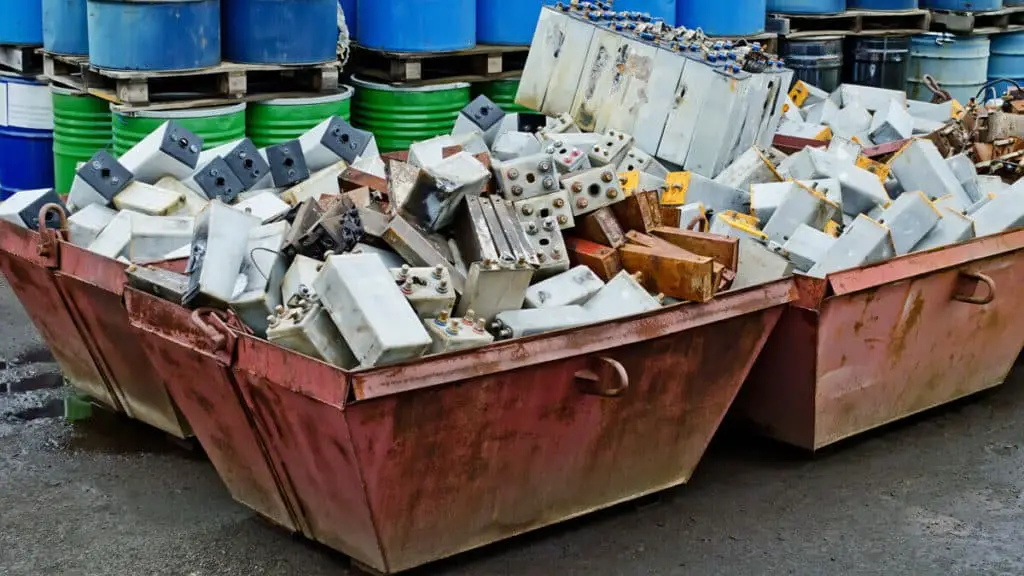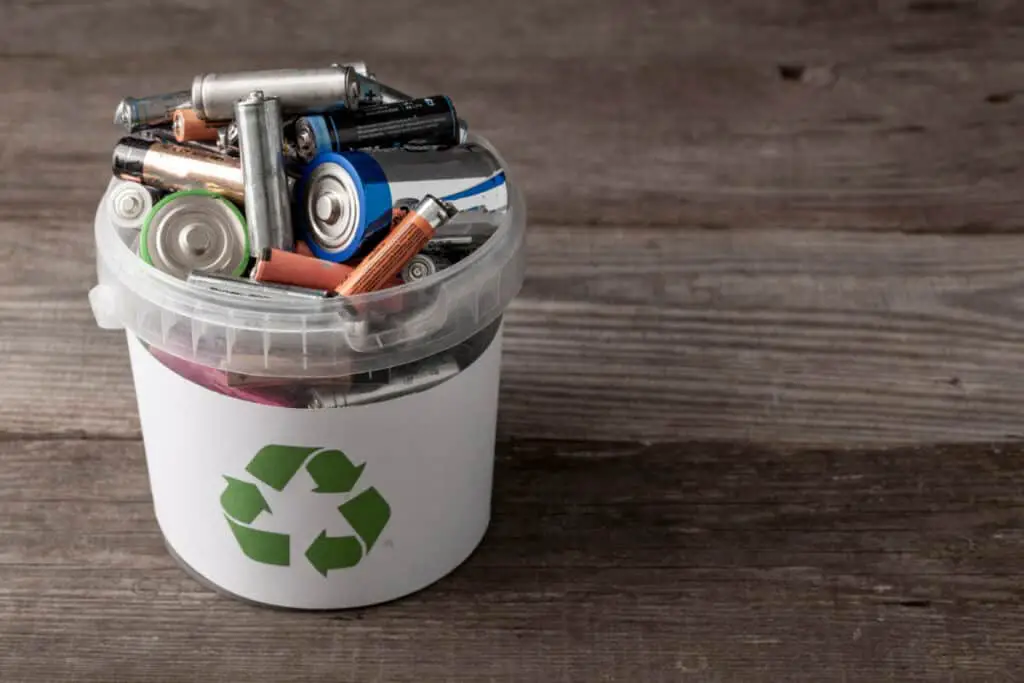
Did you know that up to 99% of a battery’s material can be recycled? Millions of batteries are thrown away and wasted every year, which means it is worth your time and effort to make sure these precious materials get recycled!
To recycle a lead-acid battery, separate the battery from the device, use electrical tape to secure the terminals, place it in a sealable bag, and bring it to a battery-recycling facility or a participating retailer. If the battery cannot be separated, bring the entire device to a specialist.
Recycling lead-acid batteries is more than a sustainable, environmentally conscious action—it may even be required by law in your area. Here’s what you need to know about lead-acid batteries, how and where to recycle them, and why recycling these particular batteries is so important.
What Is a Lead-Acid Battery?
Lead-acid batteries can be found in all kinds of devices and vehicles, from children’s toys and powered scooters to automobiles and hospital equipment. They’re also used for emergency energy back-ups, such as energy storage for power generated by solar systems, or power supplies for residential landlines. Lead-acid batteries are a popular choice for powering devices both large and small because they provide higher amounts of power than other batteries, can be recharged, are fairly inexpensive, and last a long time.
The lifespan of a rechargeable battery can be anywhere between 3-12 years. Over time, the battery will slowly lose its ability to hold an effective charge, and it will need to be replaced. This is where battery recycling comes into the equation.
Why Recycle Lead-Acid Batteries?

Lead-acid batteries are highly recyclable, meaning that almost all of their materials can be broken down and reused to make new lead-acid batteries. Materials like lead and iron are especially valuable battery components because they are completely recyclable and critical elements in manufacturing new batteries. In fact, it is so important to recycle these materials that it is required by law in many places.
In 1996 President Clinton passed the Rechargeable Battery Management Act, which was designed to ultimately phase out mercury as a material used in battery manufacturing and facilitate more efficient ways to recycle batteries for their precious materials. Battery recycling laws vary by state, but across the nation, it is required that lead-acid batteries be responsibly recycled.
Today, batteries are less toxic than they used to be, but it is still environmentally important to keep them out of our landfills. When batteries corrode and leak, they create hazardous waste in the water and air, harming critical ecosystems, compromising natural resources, and even generating chemicals called carcinogens, which are known for causing cancer in humans. Thanks to the Battery Management Act, alkaline batteries no longer contain harmful mercury vapor, but lead-acid batteries still contain carcinogens so it is vital that they do not contaminate landfills or water supplies.
These scientific discoveries are why environmental and governmental leaders are so insistent that we recycle as many batteries as possible. Not only will recycling batteries contribute to reusable resources and protect the environment, but it will also protect you and your loved ones from being exposed to harmful, corrosive materials in the area where you live.
Removable and Non-Removable Batteries

Some devices have permanent batteries built inside, while others have removable batteries. If the expired battery is removable, you can bring it to any specialized battery recycling facility near you, as well as any retailer that participates in free battery recycling. Typically hardware or office suppliers like Lowe’s, Staples, Ace, and Home Depot accept lead-acid batteries for recycling. To recycle the lead-acid battery, tape the terminals with electrical tape to prevent the risk of a fire hazard, place the battery in a sealable bag, and bring it to the appropriate facility.
If the expired battery within your device cannot be removed, you can bring the entire device to a certified electronics recycler or any retailer that participates in battery takeback services. There are also local programs that help homeowners responsibly manage hazardous waste, which can be found online through your city services. Programs and organizations such as Call2Recycle, RecyclingNearYou, or Earth 911 can help you discover battery recycling events and locations near you.
The Battery Recycling Process
In all states except California, alkaline batteries (common household batteries like AAs, AAAs, etc.) are considered nonhazardous waste and can be disposed of by taping the terminals with electrical tape and placing them in a bag. This helps prevent fire hazards and the risk of contamination. However, since lead-acid batteries are considered hazardous waste, they must be recycled by professionals. This is especially true for automobile batteries.
Here’s how it works.
Once the program of retailer collects the batteries, they take the batteries to a recycling facility to be processed. First, the batteries are broken apart into their separate pieces: plastic, sulfuric acid, and lead. The sulfuric acid is neutralized and can be used in things like fertilizer or detergent. The plastic and the lead are separated by being heated in large vats, where the lead will sink and the plastic will float.
Recycled plastic can be used to create casings for new batteries, and recycled lead can be used to make the conductors and terminals for new batteries. It’s an incredibly efficient process and makes a tremendous positive impact on the environment and the overall battery manufacturing process.
For a visual idea of just how this process works, here’s a video of lead-acid batteries being recycled in a battery recycling plant:
Can Lead-Acid Batteries Be Thrown Away?
No, lead-acid batteries cannot be thrown away. Some of these batteries contain what are called critical minerals, which are raw materials that professional geologists within the United States have deemed highly important and difficult to substitute. It is economically and strategically important to sustain these materials by recycling batteries.
It should also be noted that you should never leave old batteries within a device you are donating or throwing away. When batteries sit in an unused device for too long, they begin to corrode. Corrosive battery materials are toxic and make it highly dangerous for the old batteries to finally be removed from the device.
Related Topics:
If you like the article above, here are some other similar articles you should check out!
